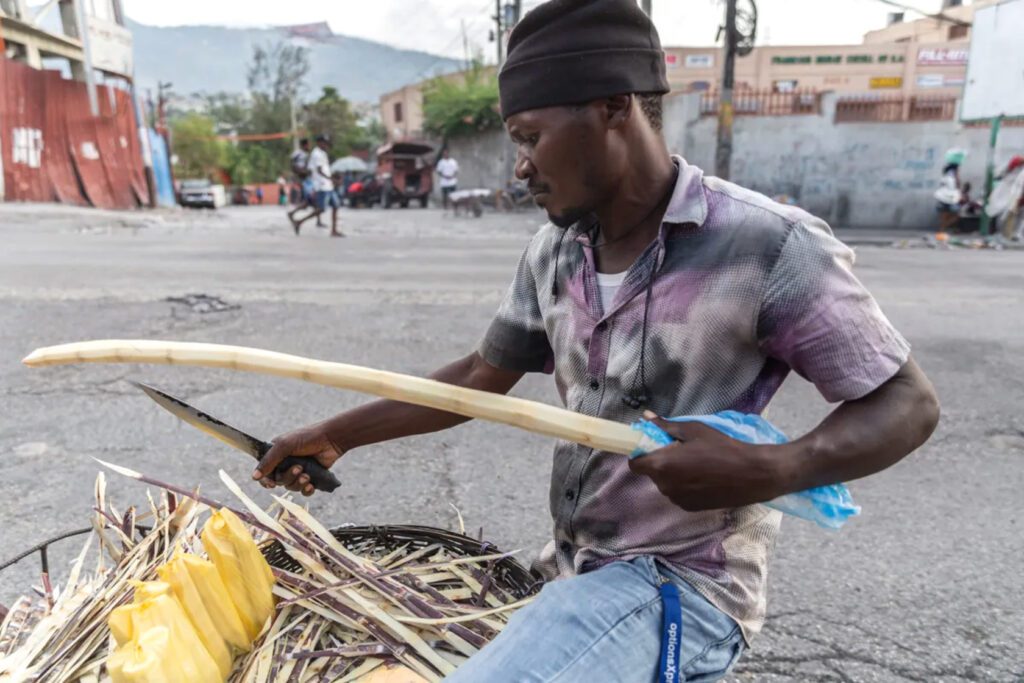
Congresswoman Ayanna Pressley was among a group of Democratic leaders, advocates and heads of Haitian-led organizations calling for U.S. elected officials during an April 11 press call to take “critical action” in addressing the escalating humanitarian crisis in Haiti.
The Caribbean nation has been in a state of chaos following a takeover by violent gangs in February and the resignation of former prime minister Ariel Henry in March. Currently, 362,000 Haitians are internally displaced, the majority of them children, according to the UN International Organization for Migration, and many civilians have been left without basic necessities.
“We’re not letting up, because stabilizing Haiti is not just the right thing to do. It is also…essential to addressing the migrant crisis here at home,” Pressley said during the call, which was organized by immigrant advocacy group American Voice. “So, while we continue working to deliver the federal resources needed for states like Massachusetts to meet the needs of vulnerable Haitian migrants, the U.S. has got to prioritize our foreign policy to stabilize Haiti.”
Some of the necessary actions, she said, include redesignating Temporary Protected Status, or TPS, which allows Haitian immigrants to lawfully reside in the U.S. temporarily, and stopping deportations because “sending anyone back to Haiti right now would be a death sentence.”
She also called for the regulation of arms trafficking to Haiti, the practice of which “has fueled the unspeakable violence we’re witnessing today.” Many of the advanced weapons entering Haiti come from Florida, the AP reported.
“Urgency and compassion” are key in any moves taken to mitigate the crisis and should be centered on supporting a Haitian-led democratic transition bolstered by “security, humanitarian [and] economic assistance,” said Pressley, who is co-chair of the House Haiti Caucus.
In a statement to the Bay State Banner, Pressley said, “Our response to the crisis in Haiti must be driven and informed by the Haitian people and those most impacted, including diaspora communities in Massachusetts and beyond.”
Haiti last week instated a transitional ruling council comprising members of the country’s main parties and civil society representatives that will work to reinstate order in the country, the New York Times reported. The legitimacy of the council has been questioned, but many view its establishment as a positive step.
Jimmy Chérizier, a Haitian gang leader known as Barbecue, decried the transitional council and threatened violent action toward those who planned to support it.
As the country’s crisis heightens, some U.S. elected officials are mobilizing to aid Haitians who have fled. On the call last Thursday, U.S. Rep. Cori Bush of Missouri called for the release of detained Haitians, facilitation of the eventual emigration of Haitians via the Dominican Republic and accommodations for Haitian asylum seekers.
Bush said she would continue to push the Biden administration “to support those who are fleeing and facilitate genuinely Haitian-led solutions that achieve security [and] democracy.” She added that the U.S. government “needs to play a constructive role in supporting Haitian-led solutions for democracy and stability in the country, because we know the role it has historically played.”
Bush highlighted the U.S. refusal to recognize Haiti’s independence and the subsequent occupation of the Caribbean nation from 1915 to 1934. In the following years, she noted, the U.S. supported dictators such as former president François Duvalier.
While elected officials did not lay out long-term steps to maintain peace in the country, some scholars have outlined both international and internal solutions. In an op-ed in The Conversation, scholars Emmanuel Sael and Jean-François Savard suggested an international alliance that would support Haitian police in their efforts to bring order to the country and train Haitian public servants who can ensure the sustainability of the public infrastructures.
Kenya’s U.N.-backed plan to deploy 1,000 officers to Haiti as part of an international security force stalled after a Kenyan court ruled the move unlawful in January, Reuters reported.
Also on the call last week was South Florida Democratic U.S. Rep. Sheila Cherfilus-McCormick, who introduced the Caribbean Arms Trafficking Causing Harm Act, or CATCH Act, to stop American guns from landing in the hands of gangs in the Caribbean. Cherfilus-McCormick said she would put pressure on Congressional Republicans to release funding to Haiti after they blocked $40 million in aid, the Times reported.
“We must recompense the Haitian people in the country of Haiti, the involvement that we have had in bringing Haiti to where it is, we must recompense by providing the necessary funds, by having a long-term, sustainable plan to help Haiti actually achieve its dreams of a democracy and a fair and equitable society,” she said.
A Haitian man currently in the country shared the struggles of the Haitian people during the call. “The situation is dire in Haiti and it is unprecedented,” he said through a translator, noting that some Haitians have no food, gas or shelter as gangs continue to steal or burn their belongings.
He painted a grim picture of the ongoing crisis, one in which schools are indefinitely closed and dead bodies are scattered across the ground. The Haitian man said his brother passed away due to a lack of access to health care.
“The government of Haiti does not have any control of the police officers who are fighting to keep the situation at bay. They’re doing their best but they don’t know for how long they can continue to fight,” he said. “And the population is left to fend for themselves in this crisis.”






